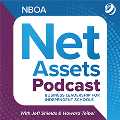
NBOA President and CEO
Back in April, encouraged by the NBOA Board of Directors, I experimented with ChatGPT to write a CEO Notebook column. My conclusion was the results were middling in terms of helping to produce a final product. But a presentation by Andy Van Schaack, Ph.D., a professor in both human and organizational development and engineering at Vanderbilt University, has put new wind my sails in regard to this tool. (No, I didn’t use ChatGPT to write this blog post, but I may yet again.) Dr. Van Schaack has been faculty for the NBOA Leadership Academy since its inception in 2020, and his presentations continue to evolve and engage. If he’s going to speak on technology topics, they must evolve with the same rapidity of the ever-changing technology landscape.
But first a shout out to the wonderful 2023-24 cohort of the Leadership Academy. The program is supported by nationally recognized NBOA leaders, Nancy Greene, vice president of finance and operations/CFO at Pine Crest School; Alex Heiberger, chief financial and operations officer at The Madeira School; Dallas Joseph, vice president of finance and operations at Baylor School; and Donna Pacchioni, retired CFO at Hawken School and Kentucky Country Day School. All serve as program mentors. Mentors and program participants learned side-by-side under the tutelage of three Vanderbilt professors and two leading consultants during live sessions in Nashville earlier this month. Participants from across the U.S. and the world engaged in wide-ranging discussions from technical and adaptive leadership to innovation in personal and school growth, and had ample time for advancing four original research projects to transform the future of independent school business. A hallmark of this program is the connections that the cohort builds, which carry throughout their careers as they advance as independent school leaders.
Dr. Van Schaack presented on two topics, beginning with evidence-based leadership. He explained how few studies in the field of education meet rigorous research standards and how Leadership Academy participants can draw on reliable data and analysis when making decisions about their schools’ strategies and tactics.
Later, he brought the October program to a strong conclusion with his presentation on technology innovation and future educational developments. He shared data on market trends, including annual investments in AI since 2010 — they have increased dramatically since 2018; the share of computer science doctorates in artificial intelligence — they have increased dramatically since 2014; and the number of new AI patents — which, surprise, surprise, have increased dramatically since 2018 as well. Nine of the top 10 U.S. companies by market cap are deeply invested in the latest AI efforts, and money is flowing to make significant advancements within the next few years. All this and more that he outlined in his presentation gives weight to his assertion that “a wave is coming” in terms of how we work.
The early waters of that wave are here. Lest anyone presume that ChatGPT isn’t already creative, Dr. Van Schaack pointed to a University of Montana College of Business study that used Torrence Tests of Creative Thinking to compare ChatGPT responses to actual business students. The gen AI responses were in the top 1% in regard to fluency and top 3% for flexibility.
I can’t do justice to the full presentation in this blog post, but I thought I could share a few quick tips in regard to “prompt engineering” or how to get the most out of services like ChatGPT. Dr. Van Schaack suggests three steps when putting together a prompt to help generate ideas and outputs.
- Give ChatGPT a role, for example, a financial consultant with independent K-12 schools or a writing coach who assists business professionals.
- Give ChatGPT a task, for example, develop a business case for an independent K-8 school focusing on a capital campaign to improve school infrastructure.
- Prompt ChatGPT to ask questions, for example, before you begin, ask me any question you need in order to do a great job.
Then, you combine all these ideas into one prompt – it will be a few if not several sentences long. And expect to go back and forth to get the feedback you seek. You can feed the tool a writing sample if you want it to mimic a certain style or ask it to adjust the tone of the output. Of course, there are so many more uses for the tool. One of my favorite suggestions was asking it to take on the role of author of a famous book and then discuss that book, so you become familiar with the main ideas. Of course, users should be aware of the tools’ limitations in terms of accuracy and bias; for further resources on this topic, see the call-out box above.
Once again, kudos to the enthusiastic and diverse 2023-24 cohort of the NBOA Leadership Academy. It’s been so inspiring over the past three years to see a broad range of independent school business leaders grow in their own capacities and together with each other. In the current environment, we all need to keep growing and moving ahead, for the betterment of our own professional development and in service and support of our schools’ missions.




